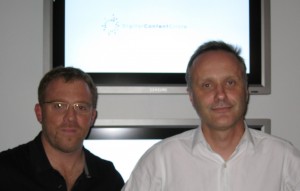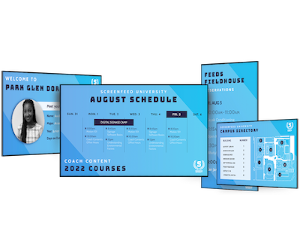Russ Curry, Ministry of New Media
I had the opportunity to catch up with Olivier Debin, President of Dagobert, and Denys Lavigne, President of Arsenal Media, in Paris after last week’s Viscom Paris 2009 conference, and ask them a couple of pointed questions about the Digital Content Circle:

Denys Lavigne and Olivier Debin
DCC: Well, we’re not giving away any secrets. All that we’re talking about are basic rules about presentation, size of type in relation to screen size, screen positioning, and developing storyboards for effective timing etc. which mean that installations can be more effective.
If more installations are effective, then that’s good for the industry as a whole, which in turn is good for Arsenal & Dagobert…
We both have a lot of experience and share the same passion for our industry. After 17 years combined experience, we have acquired a lot of knowledge about what does and what doesn’t work. So in the interests of the greater good, we want to share this experience to avoid everyone having to re-invent the wheel every time there’s a new project.
Russ This sounds a bit like Olivier’s evangelising ’10 Rules of Content‘ and the soul-bearing detailed tips that Bill Gerba publishes regularly ?
DCC: Yes, but it goes way beyond that. The idea really is to try to publish and pool knowledge about basic stuff, to centralise a body of knowledge on the subject accessible to all, so that anyone can start off a project from a solid basis. Afterwards, it’s up to the individual to make the best creative job out of his project.
Russ A sort of Wikipedia of DOOH, then?
DCC: Yes and No.
Yes, we want everyone to participate, so that we can be sure to encompass all of the best ideas and experiences of best practice.
No, because we have an editorial responsibility and the reputations of our agencies to preserve.
We’re working on how best to retain freedom and still avoid chaos…
Russ Apart from the more technical guidelines, are there any other factors that can influence a project’s chances of success?
DCC: By far the most important deciding factor is the positioning of the content team in the development of a project. It’s hard to develop a project that will be efficient if the content team is not there from the beginning – any project which starts with the hardware is almost doomed to failure. And in the ideal world, it needs to be actively supported, if not initiated, from the very top of the organisation.
Russ Can you point to any examples of what you would consider to be ‘good’ executions?
DCC: Well that’s another problem. We’d both be hard pushed to cite examples of what we consider to be really good, effective projects. To be effective, the solution doesn’t necessarily have to be complicated – it can be simple and effective as long as it’s appropriate for the situation. They do exist, but they are very thin on the ground.
Russ Concretely, then, what are the next steps? How will you articulate this noble project?
DCC: One of the first actions of the DCC project will be to create an online gallery to showcase examples of ‘good projects’ and explain why they work, so that they can be held up as references for the industry.
Another concrete application will be the creation of Toolboxes, or a core Toolbox with different sub-categories, that can serve almost as templates to ensure a good = effective execution.
Russ The project is being given a ‘soft’ launch. It is being floated out modestly with the hope of attracting as many as possible experienced practitioners to contribute. There’s a lot talk in the business about the importance of content and its impact on the success of any installation. I was impressed to meet two professionals who are prepared to dedicate both time and energy, as well as offering up their considerable acquired knowledge, for the benefit of the overall community.






Follow DailyDOOH